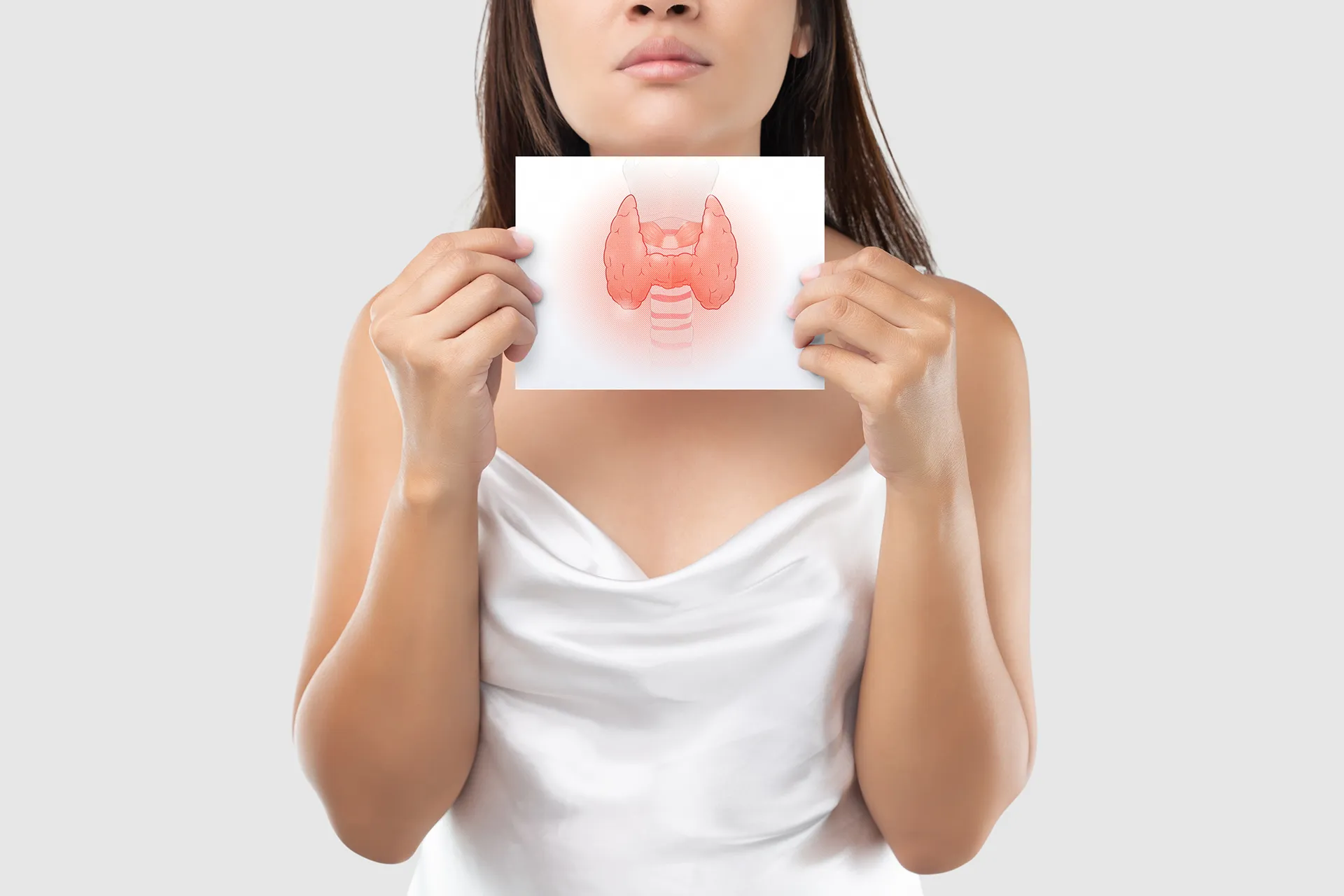Thyroid | 4 min read
Thyroid Eye Disease: What is the Cause and How to Prevent it
Medically reviewed by
Table of Content
Key Takeaways
- Dryness, watery eyes, double vision are signs of thyroid eye disease
- Inflammation due to thyroid eye disease lasts for 6 months to 2 years
- Those with a genetic disorder are at a greater risk of this eye disease
Thyroid eye disease is a disorder where eye muscles and soft tissues get inflamed and swollen. This may lead to pushing your eyes forward causing bulging eyes and other symptoms. Women with Thyroid imbalance have higher chance of puffy eyes than men with an estimated 16 per 1 lakh women getting affected as per reports. However, the disease affects men more severely.
Those with a genetic disorder are at a greater risk of developing this condition though even those with normal thyroid functioning can suffer from it [1]. For instance, in a review involving 26,084 patients, over 40% of Asians with Graves’ disease, an autoimmune disorder, had thyroid eyes disease [2]. As per specialists, 25-50% of people with thyroid issues, both hyper and hypothyroidism, develop this disease globally, with about 5% suffering from tangible vision issues [3]. However, the prevalence of thyroid eyes disease is a lot more in those with hyperthyroidism as compared to those with hypothyroidism or those with a normal thyroid [4].
While hypothyroidism and dry eyes are linked together, bulging eyes are seen most frequently with hyperthyroidism. But why does this happen? Read on to understand the cause, complications of thyroid eyes disease, and the tips to prevent it.

What is thyroid eye disease?
Thyroid eye disease is an autoimmune disorder where your immune system attacks tissues surrounding the eye. This causes inflammation in your eye muscles, eyelids, tear glands, fatty tissues, and other tissues behind and around the eye. This results in your eyes and eyelids feeling uncomfortable or becoming red or swollen or being pushed forward. Sometimes, patients may experience stiffness and swelling in the eye muscles, causing double vision. Similarly, ulcers on the eyelids may make it difficult for patients to close them or the pressure on the nerves may lead to reduced vision.
Additional Read: Signs of Hyperthyroidism and Hypothyroidism: A Guide to the Two Thyroid ConditionsWhat are the symptoms of thyroid eye disease?
Some common symptoms include the following.
- Staring or bulging eyes
- Watery or dry eyes
- Sensitivity to bright lights
- Swelling of the eyelids
- Bags under the eyes
- Blurred or double vision
- Redness of the eyes and eyelids
- Pain and pressure in or behind the eye
- Difficulty moving or closing eyes
- Redness and irritation in the eyes
- Dull appearance of colors
What are the complications of thyroid eye disease?
Those who smoke, have diabetes, and are older are more likely to be affected by this disease. In cases of severe thyroid eye disease or when treatment has been delayed, lasting complications may occur. Some of them include damage to the cornea, permanent squint, double vision, and altered appearance of the eyes. Some patients may also experience poor vision due to damaged eye nerves. However, most people don’t develop permanent complications.
What are the treatments available for thyroid eye disease?
Medical treatment
Lubricating eye drops
Your doctor may suggest artificial tear drops, gel, or ointments to help relieve dryness and scratchiness in the eyes.
Steroids
You may be given oral or intravenous steroids to reduce swelling in your eyes. Hydrocortisone, prednisone, and omeprazole are some steroids that are prescribed by doctors. Steroids can also help reduce double vision and redness of the eyes and eyelids.
Prisms
Glasses with prisms may be prescribed by the doctor to counter double vision caused by thyroid eye disease.
Surgical treatment
Eyelid surgery
Thyroid eye disease may lead to difficulty in closing the eyelids, leaving the cornea more exposed and causing irritation or corneal ulcers. Eyelid surgery is prescribed in such cases to reduce the exposure of the cornea and protect your eyes.
Eye muscle surgery
This helps treat double vision in case it cannot be controlled with prisms. The affected muscle is moved back from its position on the eyeball. Some patients require more than one surgery for satisfactory results.
Orbital decompression surgery
This is done to improve your vision by removing excess tissue or expanding the eye socket if there is pressure on the optic nerve. It may be also done to reduce bulging of the eyes and improve appearance.
Additional Read: Active and Passive Immunity: How do They Differ and How do They Function?Thyroid eye disease affects each person differently with inflammation lasting for 6 months to 2 years. However, you may experience other effects even after the swelling subsides. Thus, it is better to consult an ophthalmologist or endocrinologist at the earliest. You can now book an appointment online and consult with the best of doctors virtually on Bajaj Finserv Health.
References
- https://rarediseases.org/rare-diseases/thyroid-eye-disease/
- https://onlinelibrary.wiley.com/doi/full/10.1111/cen.14296
- https://www.reviewofophthalmology.com/article/thyroid-eye-disease-its-causes-and-diagnosis
- https://systematicreviewsjournal.biomedcentral.com/articles/10.1186/s13643-020-01459-7
- https://my.clevelandclinic.org/health/diseases/17558-thyroid-eye-disease
- https://www.btf-thyroid.org/thyroid-eye-disease-leaflet, https://www.webmd.com/eye-health/graves-eye-defined
- https://preventblindness.org/thyroid-eye-disease/
- https://patient.info/hormones/overactive-thyroid-gland-hyperthyroidism/thyroid-eye-disease
- https://www.reviewofophthalmology.com/article/thyroid-eye-disease-its-causes-and-diagnosis
Disclaimer
Please note that this article is solely meant for informational purposes and Bajaj Finserv Health Limited (“BFHL”) does not shoulder any responsibility of the views/advice/information expressed/given by the writer/reviewer/originator. This article should not be considered as a substitute for any medical advice, diagnosis or treatment. Always consult with your trusted physician/qualified healthcare professional to evaluate your medical condition. The above article has been reviewed by a qualified doctor and BFHL is not responsible for any damages for any information or services provided by any third party.






